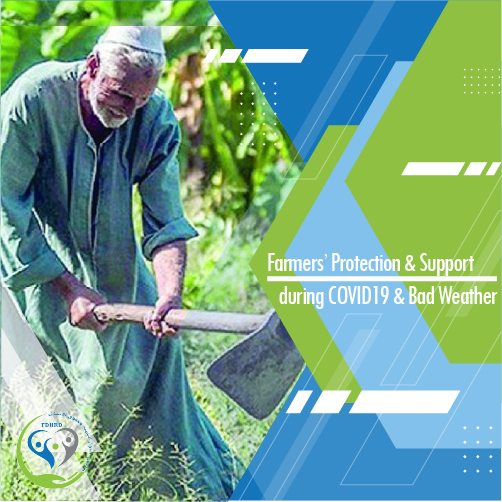Saturday, April 11, 2020
The Forum for Development and Human Rights Dialogue on Saturday issued a policy paper on “Social protection and economic support for small farmers affected by the Covid-19 virus epidemic in Egypt and the bad weather wave”, which addressed the economic damage suffered by the 6,478 million workers in the agriculture sector, who make up about 25.6 percent of the total workforce, according to statistics from the Central Authority for Public Mobilization and Statistics.
The paper called for the establishment of an agricultural solidarity fund, to compensate farmers for the losses that will be inflicted on them, as a result of the Corona epidemic and the wave of bad weather while working to stimulate and support the agricultural sector, whether it provides the needs of the local market of goods or the export sector, as well as in other sectors ‘industrial, real estate’ and ‘tourism’, and the activation of the file of agricultural insurance on crops, which contributes significantly in several countries to compensate small farmers for the losses suffered during the crisis period.
The support should include granting small interest-free loans to farmers, postponing payments to farmers at the Egyptian Agricultural Bank, and lifting customs for feed to address price hikes, especially in light of the high prices of production supplies, as small farmers represent a broad segment of Egyptian society, and there is a social need to take into account their difficult economic conditions under the current situation.
The paper stressed the need to review the prices of fertilizers supported by farmers as global fertilizer prices fall, and global gas prices drop to nearly low levels, at $1.77 per million thermal units with a comprehensive review of subsidies, which benefit neither the agricultural sector nor farmers.
The paper noted the importance of analyzing the lessons learned from the Corona crisis, to maximize our agricultural production, and to work towards self-sufficiency in strategic crops, which can be dispensed with, such as wheat, maize, etc., by preparing a short-term and long-term plan for self-sufficiency.
The paper recommended maximizing the use of agricultural research centers at the time, where they could help vertical expansion of agriculture, better, faster and lower costs, prepare for the wheat harvest, and have an effective practical application of the state’s precautionary measures for Corona, during the near harvest period or in terms of supply and action plan to prevent over-supply and collection processes.
Work to remove the obstacles facing the Egyptian farmer in terms of providing seeds, fertilizers and pesticides at affordable prices, marketing and purchasing crops at prices that make farmers profitable.
It also recommended reviewing the role of cooperatives, amending the law and establishing a cooperation bank, to solve the problems of financing and protecting small farmers and young people, encouraging them to set up small projects, developing the Egyptian countryside and supporting fertilizer production supplies, selling diesel and gasoline at cheap prices in light of low oil prices, and obliging farmers to grow grain every year and buy them at affordable prices that will make a profit for the farmer, with the government dominating the larger percentage of purchases and supplying small farmers and herders with seeds, tools, feed and other agricultural inputs, in addition to supporting animal health, so that they can continue to increase income and produce food for their families and communities.






